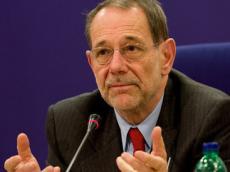Today.Az » Analytics » Re-Electing Europe
01 May 2014 [08:30] - Today.Az
 By Javier Solana
By Javier Solana
EU High Representative for Foreign and Security Policy, Secretary-General of NATO, and Foreign Minister of Spain. He is currently President of the ESADE Center for Global Economy and Geopolitics and Distinguished Fellow at the Brookings Institution.
The run-up to next month's European Parliament election has been characterized by a stifling tension between pro- and anti-Europeans. Surveys show that the two main political forces, conservatives and social democrats, are still running close (and far ahead of the rest); however the rise of populism is deeply worrying to everyone who believes in European unity - not only conservatives and social democrats, but also liberals and greens.
Parties like the National Front in France or the United Kingdom's Independence Party could become front-runners in their respective countries, and they are not alone. In Finland, Austria, Holland, Hungary, Greece, and elsewhere, anti-European parties and more traditional Euroskeptics are benefiting from growing disillusion with Europe's institutions, the remedies used to combat Europe's ongoing economic crisis, and the widening division between the European Union's north and south. Despite a rapid succession of significant steps, citizens throughout the EU sense too little improvement where it matters most - in their everyday lives.
But the battle between pro- and anti-Europeans is masking what really is at stake - and thus what should be the focus of electoral debate: how Europe can generate sustained economic growth. This question, rather than an endless defense against Euroskepticism, should be the main item of deliberation for parties pushing for an improved Europe for all. Broad-based recovery - in investment, demand, and employment - is the best weapon with which to confront those who would destroy the European project.
The upcoming election will render the public's judgment on the success or failure of the austerity policies that have been undertaken. But it will also determine whether Europe will be able to remain the world's leading economic power, maintain its social model, and safeguard its framework of rights and liberties in a world that will not wait for Europeans to resolve their differences.
Not long ago, while teaching a class in which European students were a small minority, I conducted a brief experiment, a variant on John Rawls's famous "veil of ignorance." I asked the students where they would prefer to be born today if they could choose. The answer was virtually unanimous: the majority chose a European country.
But, though Europe's magnetic power is still strong, the EU's member states are too small to compete on a global scale with China, the United States, or India. To do so, they need an even more integrated Europe.
Indeed, as the Ukraine crisis shows, European countries cannot live in self-absorbed isolation. Integration is as urgent today as it ever was, especially in sectors such as energy. A single energy market is essential not only to ensure secure and reliable supplies, but also to achieve sustainable growth compatible with Europe's commitments on climate change. The Transatlantic Trade and Investment Partnership with the United States is another imperative for policymakers - one that is key to creating jobs on both sides of the Atlantic.
Above all, the EU needs to gain greater democratic legitimacy if it is to counter the growing sentiment that the European project benefits only Europe's elite. Worryingly, the anti-Europeans' simplistic message is striking a chord with a large segment of Europe's voters. That should come as no surprise: Just 31% of Europeans say that they have confidence in the EU, down sharply from 52% in 2007, while the share of those with a negative view of the EU has almost doubled, from 15% to 28%, during this period.
Though confidence in the EU has declined dramatically during the European Parliament's current electoral term, the trend is not irreversible. Voters are critical of today's policies, but the European ideal will survive if it can be modernized and serve again as a source of hope for EU citizens.
That may be a big "if," especially given that the greatest threat posed by anti-European parties consists not in the number of seats they win, but rather in their ability to influence the political mainstream. If the main parliamentary forces are tempted to take on anti-European ideas for electoral reasons, their opponents could achieve some of their objectives: blocking the integration process, restricting the free movement of people, or approving xenophobic policies.
Faced with this, Europe should move toward what might be called "Erasmusization," building on the success of the EU's Erasmus scholarships. By enabling students to study across the EU, the Erasmus program promotes a robust exchange of experiences, ideas, values, and ways of life. And, to the extent that it has emerged as a potent force among younger Europeans, it is also Europe's best chance for a future of freedom and prosperity.
If the EU gains greater democratic legitimacy and designs lasting and credible solutions for its economic problems - unemployment, poverty, and inequality - the confidence gap should begin to close rapidly. It will then be possible to make progress on other important questions that have been postponed since the crisis erupted five years ago.
The European Parliament's new control over the selection of the European Commission's president (and thus members) is a giant step forward in terms of democratic legitimacy. However, if the upcoming election deepens the fissure between pro- and anti-European forces, popular disaffection with Europe will continue to metastasize, foreclosing a new golden age in which Europe - a century after World War I - remains the world's best place to grow up, work, and live.
Copyright: Project Syndicate
/AzerNews/
|
|